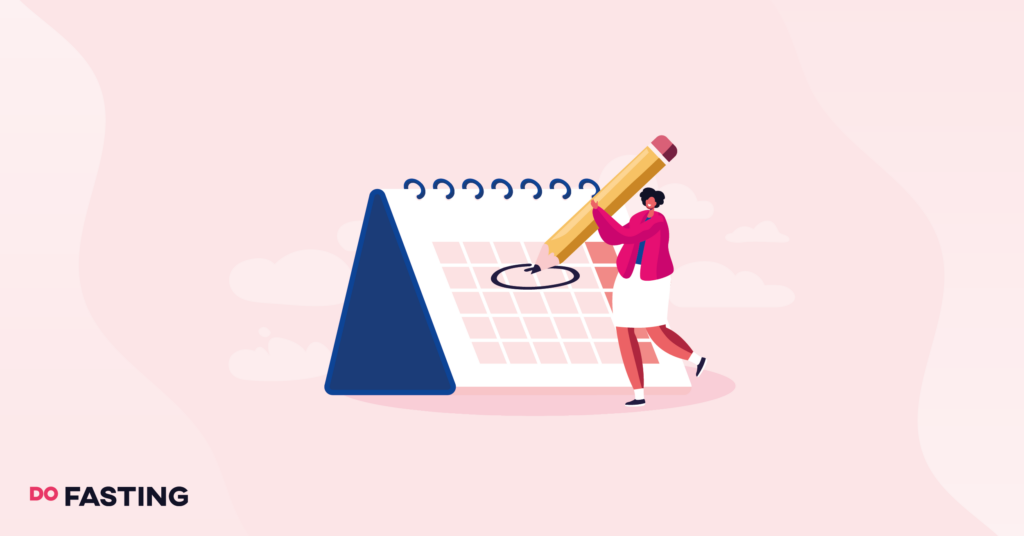Contents
What Is the 5:2 Diet?
The idea of the 5:2 diet is that you eat regular calories, following a healthy diet, for five days of the week, and then you fast for the other two days.
While you can choose which days of the week to fast, we recommend picking non-consecutive days, especially when starting out.
On fasting days, your calorie intake is restricted to 500 calories if you’re a woman and 600 calories if you’re a man.
Take a
1-minute quiz
and discover how much weight you can lose with DoFasting!

How to Do 5:2 Fast Successfully?
This diet is great for weight management. Below we have listed a few ways to get the best results out of the diet.
Plan the 5:2 diet when having the least amount of social activities
For best results, you should plan your fasting periods on days when you have the least amount of social obligations.
The main reason behind this is so that you’re not pressured to eat and you don’t have to answer questions about your diet.
It is easy to be tempted to break your fast if you’re with other people so plan in advance.
Before starting Fasting, have meals loaded with lean protein and healthy fats
To prepare for the days when you fast, eat lots of lean protein and healthy fats while staying within your normal calorie intake.
The lean protein will help to make sure your body does not burn any muscle mass for fuel and the healthy fats will help to induce ketosis quicker in your body.
Ketosis is the metabolic state responsible for burning body fat that results in overall weight loss during fasting periods and can be induced with high fat, low carb diets, like the keto diet.
Buy groceries for 500-600 calorie meals ahead of time
Fasting days can be mentally taxing and being prepared can ensure you don’t break your fast due to not knowing what to eat.
Try planning in advance so that you have the ingredients to make your 500 calorie meal as easily as possible.
Get an app that tracks calories and fasts during the 5:2 diet
Staying on track is essential when trying this diet and you can try our very own DoFasting app to help you out.
The Do Fasting app can help to organize your fasting days, provides recipes under 500 calories, and helps you track your eating schedule, as well as lets you log the water you drink, offers workouts, and reminds you when to fast.
By keeping all of your fasting data in one place, you will be able to see what you’re eating and how you’re spreading out your calories on days with a calorie restriction.
You will also be able to track your caloric intake on eating days to ensure you’re still eating at a deficit. Remember to eat fewer calories and not binge on your eating days too, though ensure you get enough for a normal day.
Take a
1-minute quiz
and discover how much weight you can lose with DoFasting!

Expect the hunger pangs but know how to deal with them
You may find that on fasting days you find it difficult to stay on track. This could be because of hunger pangs which can be controlled with an appetite suppressant.
We offer our DoFasting appetite suppressants to keep hunger at bay and feel full on days when you eat at a calorie restriction.
You should also ensure you stay hydrated on fasting days, consuming calorie-free drinks to keep your body in good shape.
What Are the Main 5 Health Benefits of Doing the 5:2 Diet?
When it comes to 5:2, there are a number of benefits for your health as it’s not just about losing weight with intermittent fasting.
-
Improved the brain function
It is thought that this diet may improve cognitive function. Research shows that it helps to boost brain function and can even help with mental health.
Research is limited but it is thought this link is due to reduced inflammation and promoted cell renewal.
-
Improved cardiovascular health
Fasting and eating at a calorie restriction are thought to help lower the risk of cardiovascular conditions, boost heart health, and improve overall health.
Fasting helps to lower cholesterol, particularly LDL cholesterol which is known as bad cholesterol, as well as many other markers of cardiovascular conditions.
These markers include high blood pressure and high triglyceride levels – both of which are lowered when following a 500 calorie diet.
Lowering these risk factors of poor heart health can help to lower the chances of developing heart disease, stroke, and other cardiovascular diseases.
In addition, the weight loss experienced on this kind of diet can also boost heart health.
-
Weight and fat loss
Weight loss is one of the main reasons people take on a fasting diet. This is because the weight lost while fasting is long-term, as it’s not water weight but rather fat burning away.
Weight loss occurs on this kind of diet for a few reasons. The first is because of the caloric deficit that fasting forces. By restricting eating times, you’re restricting your caloric intake and are less likely to overeat, helping you to lose weight.
It is also thought that fasting can help to boost metabolic rate, which helps to maintain weight loss. Indeed, there is evidence to suggest that metabolism may be boosted by at least 14% during short-term fasting.
In addition, during fasting, your body enters a metabolic state of ketosis wherein fat is burned rather than blood sugar as fuel. This means more body fat is burning during fasting periods.
This metabolic switch helps people to lose weight by increasing the amount of body fat that is lost. This method of weight loss is similar to that seen in the Keto Diet although you can actually combine the two for even better results.
-
Reduced inflammation
It has been shown that markers of inflammation are reduced when on an intermittent fasting diet.
Inflammation is the body’s natural response to pain and injury and can be very helpful. However, chronic inflammation can be linked to a number of conditions, like arthritis.
A reduction of inflammation may help to reduce symptoms of chronic conditions.
-
May reduce the risk of type 2 diabetes
Intermittent fasting methods are thought to help with blood sugar regulation.
Fasting diets mean reduced food intake which means that there are fewer spikes in blood sugar throughout the day, helping the body have a normal response to insulin.
This normal response helps to reduce insulin resistance, and by extension, the risk of developing type 2 diabetes.
It should be noted that low blood sugar is a risk on days of the week when you fast and should be monitored.
What to Eat on Fasting Days?
When it comes to fasting diets, there are a few things you should be eating on fasting days to get the most out of your calories.
This is important so that you wouldn’t suffer any nutrient deficiencies, and that the energy released from food will keep you going for a longer period of time.
Foods to have during the 5:2 diet
Eating nutrient-dense foods is essential when you are restricting calories. These are your best bet to achieve great results.
- Fruits, like citrus and berries with lots of fiber and vitamins
- Vegetables, and starchy vegs, like squash, sweet potato, kale, spinach, and other leafy greens, zucchini
- Grains, like oats, barley, and quinoa
- Protein, like fish, tofu, and eggs
- Fats, like extra virgin olive oil, avocado, and nuts
- Nuts and seeds, like pumpkin seeds, sunflower seeds, cashews
- Lots of water and zero-calorie beverages
Healthy 500-600 calories meal ideas to have during 5:2 fast
On the DoFasting app, you will find lots of recipes that are suitable for fasting days. Below we have summarized two example fasting day meals which can all be found on the app.
Day 1:
Breakfast: Tofu Scramble with Almond Milk (194 calories)
Lunch/dinner: Pasta with Ground Turkey (308 calories)
Day 2:
Breakfast: Fried Egg with Spinach and Parmesan (273 calories)
Lunch/dinner: Zucchini Noodles with Chicken (290 calories)
Foods to avoid when following the 5:2 diet
Along with a bunch of foods you should be eating, come a few foods you absolutely shouldn’t eat during this diet. These include
- Sugary foods and baked goods
- Deep-fried and fast food
- White bread
- Sugary drinks
The idea is to stay away from any foods that can cause cravings or withdrawal symptoms on the fasting days of this diet.
What Are the Drawbacks of the 5:2 Diet?
Like any method of weight loss, intermittent fasting diets come with some drawbacks too. And if you’re feeling unsure, you should always consult your doctor before starting a diet.
Following the 5:2 diet is associated with a higher chance of overeating
With long fasts come some hunger cravings and it is these hunger cravings that could lead to overeating on the non-fasting days of this diet.
It is recommended that you try to eat a healthy amount of calories from a well-balanced diet on eating days and that you get in some exercise too.
Overeating and consuming too many calories on the non-fasting days of a fasting diet can cause you to gain weight which can lead to people giving up.
Remember to include all food groups and get a balanced diet to nourish your body to make the days where you reduce calorie consumption easier to manage.
Hunger pangs
Hunger pangs can come from a daily calorie restriction which can lead to headaches, dizziness and feeling faint.
You may be able to counter some of these feelings by taking an appetite suppressant and spreading out your calories across the day on days when you are fasting.
When following the 5:2 diet there is a higher chance of developing an eating disorder
This kind of diet requires you to count calories and severely restrict what you eat on certain days. This kind of eating can be a trigger for eating disorders in some people.
Eating pattern disorders can lead to more severe problems where people find themselves unable to get back into a pattern of healthy eating.
If you have had or currently suffer from eating disorders, you should consult with your doctor before starting any diets or plans such as intermittent fasting.
Is the 5:2 diet safe for everyone?
Though intermittent fasting is considered a safe method of weight loss, there are some people who should not try using this method of fasting.
- Women who are pregnant or breastfeeding – nutrition is vital in these stages of life and restricting calories may lead to malnutrition, especially as the baby draws away some of this nutrition too.
- People who have had eating disorders in the past – As discussed, intermittent fasting encourages huge changes to normal eating behavior which can trigger eating disorders, especially in those who have already suffered from this in the past.
- People under 18
- People with type 2 diabetes – while intermittent fasting may help to prevent type 2 diabetes, if you are already suffering from it, you should not fast
- Anyone with a condition that could be exacerbated by fasting – If you think this could be you, always consult a doctor before trying out any kind of intermittent fasting method.
Conclusion
The 5:2 diet involves eating normally for five days and then eating at a reduced-calorie number for the other two days.
There are health benefits and drawbacks of this diet and you should consider both before trying out 5:2 intermittent fasting.
Take a
1-minute quiz
and discover how much weight you can lose with DoFasting!

See how DoFasting will improve your life
Find out what works for you with this 60-sec quiz approved by our experts and get your personal revolutionary fasting assistant.
Start the Quiz















